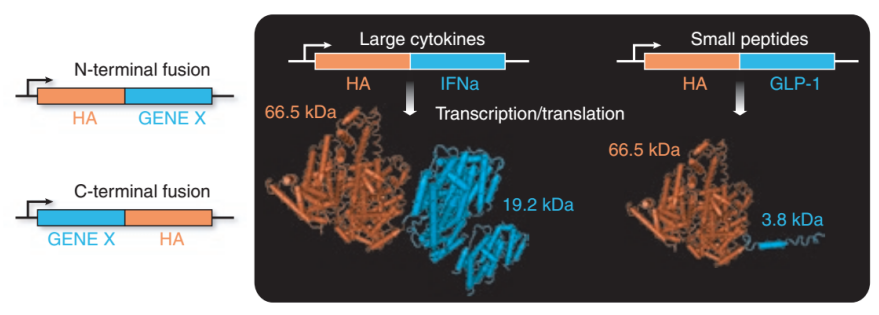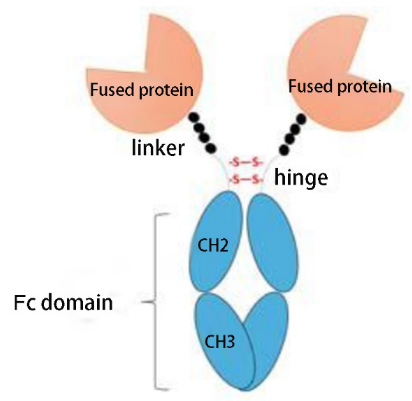Fusion Protein Expression
Fusion proteins are widely used to investigate protein functions, and to facilitate protein expression and purification, as well as to promote protein bio-availabilities. In the field of biological medicine, in particular, fusion proteins play important roles in achieving prolongation in vivo and direct targeting of drug candidates.
Currently, one of the most promising fusion proteins is the Human serum Albumin (HSA) fused therapeutic protein. In the last few decades, HA has been found as a drug delivery vector for tumor treatment, as albumin can accumulate in solid tumor. Because of this reason, gene fusion protein with albumin has attracted increasing attention in the pharmaceutical industry. HA-GLP1 fused protein (Tanzeum), for treatment of type 2 diabetes, was approved by FDA in 2014. HA-IX clotting factor fused protein (IDELVION), for treatment of hemophilia, was approved by FDA in 2016. By far, more than 60 therapeutic recombinant HA-fusion proteins have been successfully expressed; and some of them have entered medicinal stage.
 Figure 1. Human serum Albumin (HA) fused therapeutic protein.
Figure 1. Human serum Albumin (HA) fused therapeutic protein.
Another attractive fusion strategy is Fc fusion protein. Proteins tend to have a short half-life in plasma. However, fusion of the Fc fragment of immune globulin can prolong protein durgs’ half-life and reduces the its immunogenicity. Fc-fusion protein drugs such as Fc-GLP-1 fused protein (Trulicity) for type 2 diabetes, Fc-TNF receptor fused protein (Etanercept) for rheumatoid arthritis, have been proven to be successful. Moreover, it has been reported that mutating the critical residues located on the Fc dimerization interface can significantly enhance the protein stability, which gives more insight into clinical development of Fc-fusion proteins. In addition to therapeutic proteins, chemical molecules can also be conjugated to Fc fragments to pursue higher stability.

Figure 2. Fc-fusion Protein
Here we provide featured one-stop fusion protein production service, which includes construct designing, cloning and protein expression. At Profacgen, we are seasoned in protein expression (cell-based and cell-free) and structural design with different tags (N-terminal/C-terminal) depend on customer’s requirements. Profacgen provides gene-to-protein service with our in-house platform. In addition, the produced fusion proteins can be tested for full-length expression, folding, and activity. Our expertise guarantees high protein quality, short turnaround time, and the best price in the market!
See more details on the principle and protocol of yeast expression system on our website.